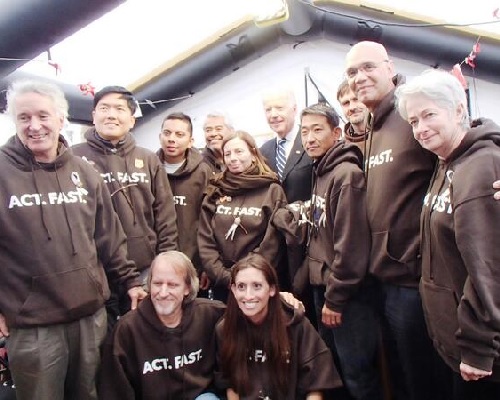 Will Boehner Continue to Side with King’s 18% or the Majority of Americans Who Support a Path to Citizenship?
Will Boehner Continue to Side with King’s 18% or the Majority of Americans Who Support a Path to Citizenship?
The contrast between the commitment, support, and values motivating those supporting and opposing immigration reform is in particularly sharp relief this week.
New polling from Public Religion Research Institute (PRRI) once again demonstrates that the vast majority of Americans, including Republicans, support immigration reform with a pathway to citizenship for the 11 million aspiring Americans. Meanwhile, just ahead of the national holidays, key leaders are demonstrating their commitment to the cause of immigration reform by fasting on the National Mall. Speaking for the small percentage of Americans who support a deportation-only approach according to the latest poll, anti-immigrant extremist Rep. Steve King (R-IA) belittles the fasters’ efforts, making the offensive claim that no one in Congress would pay attention to their efforts.
According to Frank Sharry, Executive Director of America’s Voice:
With public support and intensity of commitment both overwhelmingly on the side of pro-immigration reform forces, the question remains why Speaker of the House John Boehner (R-OH) has continued to side with 18% of the nation and the small Steve King caucus in the House that opposes fair immigration reform?
Thus far this Congress, the only immigration policy that has received a vote on the House floor is Steve King’s amendment to deport DREAMers and others.
As PRRI writes of their new poll:
Throughout 2013, there has been consistent bipartisan and cross-religious support for creating a path to citizenship for immigrants living in the United States. Today, 63% of Americans favor providing a way for immigrants who are currently living in the United States illegally to become citizens provided they meet certain requirements, while 14% support allowing them to become permanent legal residents but not citizens, and roughly 1-in-5 (18%) favor a policy that would identify and deport all immigrants living in the United States illegally.
PRRI also notes, “Roughly 6-in-10 Republicans (60%) and independents (57%) and approximately 7-in- 10 (73%) Democrats favor a path to citizenship for immigrants currently living in the United States illegally.” As the pollsters highlight, “survey questions that make no mention of requirements immigrants living in the country illegally must meet produce lower support for a path to citizenship than questions that do mention requirements,” particularly among Republican respondents. Of note, between March 2013 and today, PRRI found that support among Republican respondents for a path to citizenship rose from 53% in favor to 60% in favor.
PRRI’s polling adds important new details to points we noted last week – that in poll after poll, the majority of the nation strongly backs immigration reform with a path to citizenship; and that even most Republicans and conservatives prefer the policy option of immigration reform with a path to citizenship versus other policy alternatives (including in last week’s Quinnipiac poll and in polls in targeted GOP districts in California, Colorado, Florida, New York, Nevada and Texas).
In addition to broad public support, the intensity, commitment, and energy in the debate wrest squarely on the side of reform. Julia Preston captures in the New York Times the commitment and personal toll that some pro-reform leaders are willing to engage in, profiling Eliseo Medina of SEIU, who is one of fasters on the National Mall:
As a teenage grape picker, Eliseo Medina learned political action at the feet of Cesar Chavez. In 1968, he watched Mr. Chavez hold a 25-day water-only fast that helped transform the farm workers’ union into a nationally known force.
Since then, Mr. Medina has been at the center of debates over immigrants’ rights, arguing successfully that unions should embrace unauthorized foreign workers rather than shun them as job stealers. The tactics he learned from Mr. Chavez have stayed with him.
So there Mr. Medina was on Friday, now 67 years old, in a white tent just below the Capitol on the National Mall in the 11th day of a water-only fast he hopes will ‘touch the heart’ of the House speaker, John A. Boehner of Ohio, and make him act on immigration.
Saying he will fast until his body gives out, Mr. Medina has lost 16 pounds; his face, sprouting a sparse beard, looks sunken and gray. But he perks up when he talks about the millions of immigrants — including many members of his organization, the Service Employees International Union, and a few of his own relatives — who are living in the country without legal papers.
“Whatever little sacrifice I am making doesn’t compare with the sacrifice these immigrants made when they came to this country for a better life and find themselves living in the shadows and being exploited,” Mr. Medina said, in cadences echoing Mr. Chavez.
The contrast with anti-immigrant leaders, such as Rep. Steve King (R-IA) is notable. In the same article, Preston notes Steve King’s reaction to Medina and the other fasters (which also includes conservatives, such as evangelical leader Rev. Samuel Rodriguez):
“’I don’t think anybody in Congress is going to pay any attention to that,’ said Representative Steve King, Republican of Iowa, who is a blunt-spoken opponent of legalization for those who entered the country illegally. ‘There are plenty of Americans who are un- or underemployed. Those hungry Americans are going to look at these open-border left liberals going hungry and they will have less sympathy, not more.’”
Concluded Sharry:
Absent alternative immigration approaches from other Republicans, Steve King will continue to define the GOP. This not only carries significant political ramifications, but in light of King’s latest comments, will leave the Republican Party on the wrong side of a more fundamental question: ‘what type of nation do we want to be?’

